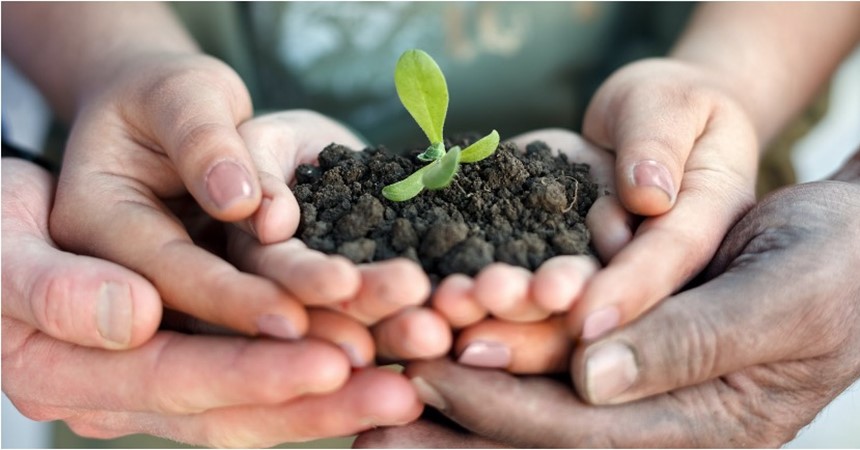Please look further into this week’s Dio Update for Brendon Mannyx’s reflection on this important week for all of us.
I was reminded of this on Saturday afternoon, when I attended the Social Justice Art Competition at San Clemente High School at Mayfield. Those present were surrounded by many artworks reflecting the title of the 2021/22 Social Justice Statement – Cry of the Earth Cry of the Poor. As I walked around and viewed the many artistic images submitted by young people, what struck me more than their artworks, were the words that accompanied them. Many had used verses of scripture to ground their works. Overwhelmingly, they spoke of God’s creation and our need to be stewards of it. Many of their images portrayed the light and dark side of life and our planet home.
There was a real depth of concern for our home and the need for action. They captured the call from Pope Francis to be in relationship with God, other people and the earth. The young artists and their families spent the afternoon exploring and enjoying these works of art. It was amazing to read the words of our Stage 4 (Years 7 and 8), young people from our Catholic Schools. I am conscious of the challenging sentiments that are put out there, regarding the purpose of our schools and yet for those of us who took the time to be at this art exhibition on Saturday, there could be no doubt as to the faith and moral formation that is occurring in them. I don’t think it wise to have ‘Mass attendance’ as the only measure of ‘success’ for our Catholic Schools.
I meet many young people, particularly in the Hunter Community Alliance, who have attended our schools. They are deeply caring, amazing individuals who are working with others to grow civil society and to make a difference. It is an honour to share with them a platform of hope for our future, by working together for the common good. We stand in solidarity with all of God’s creation (these are my words) to work on an integrated and wholistic approach to political, social, economic and environmental issues.
It seems to me that throughout history, we have been gifted with amazing people, some of whom we refer to as saints, and who have had a conversion experience. They then imagined a new and different way to see and serve the world, and then have acted. In this time, God has not abandoned us, despite the daily negative media coverage. We must hold onto hope for ourselves, and instil hope to those younger generations.
As I listened to the Second Reading on Sunday, from the Book of Revelations (21:1-5a), I encountered a strong message of hope.
Then I, John, saw a new heaven and a new earth.
The former heaven and the former earth had passed away,
and the sea was no more.
I also saw the holy city, a new Jerusalem,
coming down out of heaven from God,
prepared as a bride adorned for her husband.
I heard a loud voice from the throne saying,
“Behold, God’s dwelling is with the human race.
He will dwell with them and they will be his people
and God himself will always be with them as their God.
He will wipe every tear from their eyes,
and there shall be no more death or mourning, wailing or pain,
for the old order has passed away.”
The One who sat on the throne said,
“Behold, I make all things new.”
In more recent times we have grown in our understanding of living in a global village, an ecosystem of complex relationships, in which every action has an impact on all parts of the ecosystem. Our understanding continues to grow and develop with a movement towards, an Integral Ecology as given in Pope Francis’ Laudato Si’:
When we speak of the “environment”, what we really mean is a relationship existing between nature and the society which lives in it. Nature cannot be regarded as something separate from ourselves or as a mere setting in which we live. We are part of nature, included in it and thus in constant interaction with it. Recognizing the reasons why a given area is polluted requires a study of the workings of society, its economy, its behaviour patterns, and the ways it grasps reality. Given the scale of change, it is no longer possible to find a specific, discrete answer for each part of the problem. It is essential to seek comprehensive solutions which consider the interactions within natural systems themselves and with social systems. We are faced not with two separate crises, one environmental and the other social, but rather with one complex crisis which is both social and environmental. Strategies for a solution demand an integrated approach to combating poverty, restoring dignity to the excluded, and at the same time protecting nature. (Laudato Si, n139)
The shift from an understanding of people at the centre, to one of being in relationship with all of creation, is very profound. Humans have been created to live in relationship with God, each other and with all of creation. We are just one part of a whole ecosystem, of a web of interconnectedness, with all its complexities and scale. This is certainly reflected in the Australian Catholic Bishop’s Statement – Cry of the Earth, Cry of the Poor.
I hope you avail yourself of the many opportunities that are offered across our diocesan community. We need each other.

